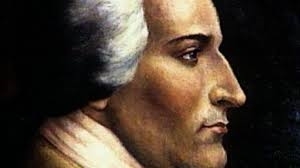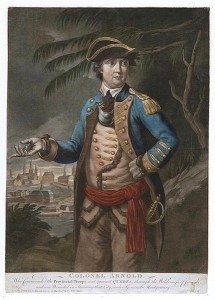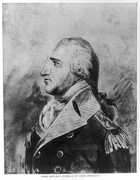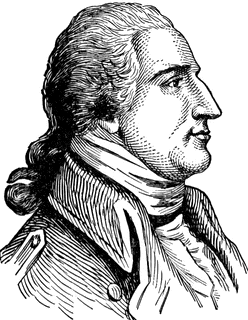 |
| Benedict Arnold (yipp.commons.yale.edu ()) |
A Tragic Hero
He was a renegade, a general, a war hero...and America's first traitor. Benedict Arnold was a traitor to his nation, but first he was the nation's Savior. An epidemic of yellow fever was ravaging Norwich, Connecticut. The sickness nearly destroyed Benedict Arnold's family and killed two of his sisters. Twelve-year-old Arnold was away at boarding school, and his mother wouldn't allow him to return for the girls' funerals, for fear he would contract the fever too. At the time, a barn near his school caught on fire. As the spectators observed, they noticed someone on the roof. It was Arnold (Sheinkin). "Death may have taken his sisters. Balancing on the burning roof, Benedict was fighting back, letting death know he would not go quietly" (Sheinkin 9). Benedict never lived a quiet life. Arnold was the sixth Benedict Arnold. He was born on January 14, 1741, in Norwich, Connecticut. From the very start, Arnold showed his fighting spirit, surviving as a new-born one of the coldest months ever recorded. As he grew, he demonstrated his bravery and leadership both on the battlefield and off. At age 18 he proved his patriotism by joining the fight in the French and Indian war. When he was 21 he took responsibility of his family, which included the family business (Sheinkin). "He was a quick learner, and a hard worker with a ferocious determination to succeed. He longed for action, craved attention, and bristled at anything he perceived as criticism or disrespect" (Sheinkin 13). He was well on his way to becoming a great leader. Although Benedict Arnold is most often remembered as a traitor, he was one of America's greatest heroes, albeit a tragic hero. A hero must demonstrate bravery and strong leadership, even in the face of very difficult circumstances. Arnold had these traits in abundance.
 |
| Benedict Arnold (allthingsliberty.com ()) |
From the time Benedict was very young he displayed bravery. One day while waiting in line to get his corn milled he decided to put on a show for the other people waiting in line. "Without a word, Benedict dropped his sack of corn, sprinted to the bank of the stream, and leaped through the air toward the spinning waterwheel. he managed to grab hold of one of the wet wooden spokes. Wrapping his body around the soggy wood, he rose high in the air, then swung upside down as the wheel turned, disappearing underwater. Seconds later he burst up with the wheel, dripping and smiling" (Sheinkin 7). Extraordinary displays of bravery were Arnold's idea of entertainment. His bravery at home developed into bravery on the battlefield. After the battle in Lexington Arnold marched several men he recruited to Boston. Upon arrival at the militia camp, Arnold found that they could not hope to take the city without any cannons. He left to go capture Fort Ticonderoga where there were over 90 cannons they could use if they could take the fort. His soldiers stayed behind to help blockade Boston. On his way to fulfill his secret mission he would have to recruit new soldiers. "On May 10, [1775], in the first American offensive of the Revolution, [Arnold's] men, together with the forces of the flamboyant Ethan Allen of Vermont, captured Ticonderoga"("Benedict Arnold Encyclopedia"). Arnold wasn't afraid to take initiative. He wasn't afraid to tackle a mission, even on his own. His bravery led to the capture of the critical fort plus essential supplies for the rebel cause. Without these, the Revolution could not have lasted. Later in the war General Washington ordered Arnold to take the fortress city of Quebec. During the attack, Arnold was shot in the leg and wounded severely. He refused to be taken away from the action. Dr. Isaac Senter treated Arnold and observed, "[Arnold] propped up in bed, his leg wrapped in bloody bandages, pistol in his hands, he waited for the British attack, declaring he was 'determined to kill as many as possible if they came into the room"' (Sheinkin 95-96). Even in a seriously wounded state Benedict was brave. Nothing would keep him from the action and his duty. His fearlessness extended to his men. He ordered all the other wounded men in the hospital to receive pistols and be ready to fight. His bravery inspired all those around him (Sheinkin).
 |
| Benedict Arnold (www.communitywalk.com ()) |
Along with bravery, Benedict also possessed immense leadership skills. In the beginning of the Revolutionary War he inspired patriotism in his fellow men. "When the news of the fight at Lexington reached New Haven, Arnold called his company together and asked for volunteers to aid the patriot cause" ("Benedict Arnold Dictionary"). Because of Arnold's own example and enthusiasm he was able to rally people together to fight. With his patriotic attitude he led his men to the battle front. During the Battle of Valcour Island Arnold found his fleet of 15 ships hopelessly outnumbered by the 34 large British ships. With Arnold's cunning plan they faced the British (Sheinkin). "The men all around him were fighting furiously. 'The engagement became general,and very warm,' he said. Arnold ran about the deck of his ship, barking orders over crashing explosions, aiming and firing the guns himself as fast as they could be reloaded" (Sheinkin 130-13). After an exhausting battle, Arnold sneaked his ships past the British during the night. He grounded his ships and proceeded to safety at Fort Ticonderoga on foot (Sheinkin). His navy fleet was completely gone, but Benedict Arnold had kept the Revolution alive. He led his crew to many victories. Arnold was always one to lead by example. His leadership skills were superb. Despite his great strengths, he could not overcome his fatal flaw--his pride. His superiors' flagrant disregard for his heroic actions finally became too much for Arnold to bear. Arnold was a Brigadier general and was first in line for a promotion. George Washington thought Arnold deserved the higher rank (Shenkin). "Arnold had been first in line for promotion, ahead of the five men Congress chose" (Sheinkin 148). Arnold was outraged and took this as a personal insult. He was so deeply offended, he decided to resign until Washington himself begged him to stay (Sheinkin). Even after Arnold did receive his long overdue promotion, when he led the Americans to victory in the most critical battle of the war, his achievements were overlooked, and the credit was given to General Gates. "Congress voted to strike a special medal just for the hero of Saratoga, awarding it to Gates . . ." (Sheinkin 191). These repeated insults proved too much for Arnold to handle. They sent him on the path to betraying the ungrateful nation for whom he had sacrificed everything. Arnold had given his life to his country. He had left his home and family and poured his wealth into the war. He had faced unjust contempt and had stared death in the face to fight for the nation he loved that could never love him back. As his bitterness grew, Arnold used his access to sensitive information to give secrets to the enemy. This action solidified his fatal flaw. This fallen hero who was wronged and ridiculed saw no choice other than to turn his back on the nation that had turned its back on him.
 |
| Benedict Arnold (etc.usf.edu ()) |
Throughout his whole life Benedict Arnold showed fearless determination that manifested itself as uncommon bravery. Arnold showed exemplary leadership. Through Arnold's heroic actions he was able to save the American Revolution on several occasions, thus saving the nation. He played a key role in several of the most important battles of the war. Benedict Arnold led the first military offensive of the war when he took Fort Ticonderoga. He also led the first naval assault in the Battle of Valcour Island. George Washington himself thought of Arnold as one of the country's greatest generals ("Benedict Arnold Historic"). He said of Arnold, "Surely a more active, a more spirited and sensible officer fills no department in [our] army" (Sheinkin 147-148). Benedict Arnold put himself in danger. He was willing to sacrifice his life for freedom. He led his troops to many victories in perilous conditions. For all his heroism, Arnold was grossly mistreated, leading him to turn on the country for whom he had given his all. But even this betrayal should not diminish his courage and leadership that preserved the country and helped make it what it is today. Arnold inspired bravery and greatness in those around him, and should inspire the same in people even now. From running across burning roof tops to running across burning ship decks, Benedict Arnold never did live life quietly. This misunderstood American hero lived life out loud.
Works Cited
"Benedict Arnold Biography." Bio.com. A&E Networks Television, n.d. Web. 03 May 2015.
"Benedict Arnold." Dictionary of American Biography. New York: Charles Scribner's Sons, 1936. Biography in Context. Web. 4 May 2015.
"Benedict Arnold." Encyclopedia of World Biography. Detroit: Gale, 1998. Biography in Context. Web. 1 May 2015.
"Benedict Arnold." Historic World Leaders. Gale, 1994. Biography in Context. Web. 4 May 2015.
Sheinkin, Steve. The Notorious Benedict Arnold: a True Story of Adventure, Heroism, &Amp; Treachery. New York: Roaring Brook Press, 2010. Print.
Page created on 5/26/2015 12:00:00 AM
Last edited 5/26/2015 12:00:00 AM
